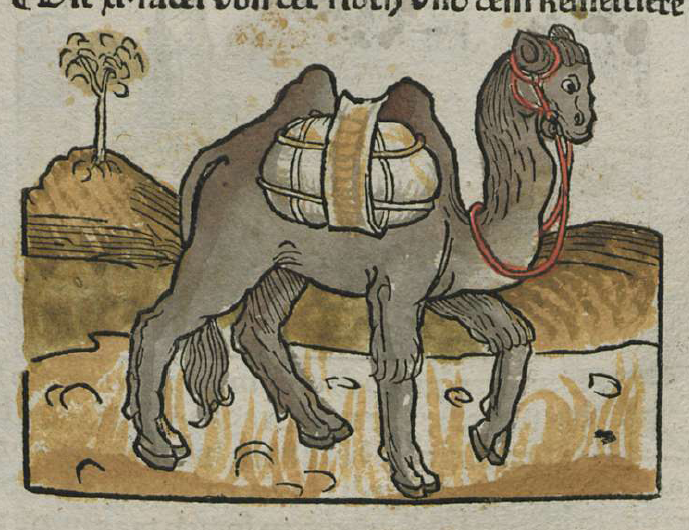Since Hector and I read the Zander version of this Phaedrus poem (reconstructed), I thought I would share this version by Gudius (Marquand Gude), another one of Phaedrus's editors. You can read more about Phaedrus at Wikipedia, and here are all the Phaedrus poems I have posted at this blog, plus all the "extra" Phaedrus poems too.
31. Pulex et CamelusPulex cameli dorso forte considens,
Gravatus multis qui incedebat sarcinis,
Sibi placebat, longe visus altior.
Iter cum longum facerent, vespera simul
Ad stabulum venerunt; pulex leviter statim
Ad terram saliens: ecce, dixit, ocius
Descendo, attritum ne gravem diutius.
At ille: gratum est, inquit; sed nec pondere,
Te imposito, me gravari sentire potui,
nec, te deiecto, habere quid levaminis.
Qui se sublimis, nullo cum sit ordine,
Iactat, notatus in despectum devenit.
Here is that poem written out in English prose order to help in reading:
Forte
pulex
considens dorso cameli
qui incedebat gravatus multis sarcinis,
sibi placebat,
visus longe altior.
Cum facerent longum iter
vespera
simul venerunt ad stabulum;
statim
pulex dixit,
leviter saliens ad terram,
"Ecce, descendo ocius
ne gravem (te) attritum diutius."
At ille (camelus) inquit,
"Gratum est,
sed, te imposito,
non potui sentire
me gravari pondere,
et, te deiecto,
non (potui sentire)
(me) habere quid levaminis."
Is,
qui iactat se sublimis
cum sit nullo ordine,
notatus devenit in despectum.
The meter is iambic:
Pulex · Came·li dor·so for·te con·sidens,
Grava·tus mul·tis qu~ in·cede·bat sar·cinis,
Sibi · place·bat, lon·ge vi·sus al·tior.
Iter · cum lon·gum face·rent, ves·pera · simul
Ad stabu·lum ve·nerunt; · pulex · leviter · statim
Ad ter·ram sali·ens: ec·ce, dix·it, o·cius
Des·cend~ at·tritum · ne gra·vem diu·tius.
At il·le: gra·t~ est, in·quit; sed · nec pon·dere,
T~ imposi·to, me · grava·ri sen·tire po·tui,
nec, te · deiec·t~ habe·re quid · leva·minis.
Here is an illustration from Steinhowel's Aesop because, thanks to the medieval tradition, this fable was part of the Aesop that Steinhowel inherited, and so also Caxton:

De pulice et camelo
Caxton: Of the camel / and of the flee
He that hath no myght ought not to gloryfye ne preyse hym self of no thynge / As reherceth to vs this presente fable of a camele / whiche bare a grete charge or burden It happed that a flee by cause of the camels here lepte to the back of the camel / and made her to be borne of hym all the day And whanne they had made a grete way / And that the camel came at euen to the lodgys / and was put in the stable / the flee lepte fro hym to the ground besyde the foote of the camel / And after she sayd to the camel / I haue pyte of the / and am comen doune fro thy back by cause that I wylle nomore greue ne trauaylle the by the berynge of me / And the camel sayd to the flee / I thanke the / how be it that I am not sore laden of the /
And therfore of hym which may neyther helpe ne lette men nede not make grete estymacion of
[more info]
Caxton: Of the camel / and of the flee
He that hath no myght ought not to gloryfye ne preyse hym self of no thynge / As reherceth to vs this presente fable of a camele / whiche bare a grete charge or burden It happed that a flee by cause of the camels here lepte to the back of the camel / and made her to be borne of hym all the day And whanne they had made a grete way / And that the camel came at euen to the lodgys / and was put in the stable / the flee lepte fro hym to the ground besyde the foote of the camel / And after she sayd to the camel / I haue pyte of the / and am comen doune fro thy back by cause that I wylle nomore greue ne trauaylle the by the berynge of me / And the camel sayd to the flee / I thanke the / how be it that I am not sore laden of the /
And therfore of hym which may neyther helpe ne lette men nede not make grete estymacion of
[more info]
No comments:
Post a Comment
Comments are limited to Google accounts. You can also email me at laurakgibbs@gmail.com or find me at Twitter, @OnlineCrsLady.